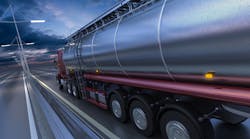Truckers who hauled gasoline to Texas last week from Florida may run the same route in reverse next week as Hurricane Irma bears down on the Sunshine State.
South Floridians are stocking up on supplies like gasoline and water while preparing to evacuate to the northern part of the state ahead of Irma, which is forecast to bring winds as high as 150 miles an hour to the state.
More than 1,200 stations in Florida metropolitan areas were without fuel late on Sept. 6, according to GasBuddy.com, a retail price-tracking service.
The rush for fuel in Florida may require supplies from as far away as Texas, which is still reeling from Hurricane Harvey. When that storm choked off major metropolitan areas like Dallas and San Antonio, surplus gallons in Florida was trucked about 1,000 miles west to the Lone Star State to ease the shortages ahead of a long holiday weekend. Those same truckers may be making the long haul back to Florida to resupply the same tanks they emptied.
“We were long-hauling from Florida to Houston last week, and now we’re talking about going from Houston to Florida,” said Andy Milton, senior vice president of supply for Mansfield Oil in Gainesville, Georgia. “That’s just the stupidity of the world we’re in right now.”
Irma comes days after Hurricane Harvey shut Texas refineries, cutting off the regular shipments via tankers and pipelines that Florida relies on. Retailers are looking for more fuel just as terminals in Florida are less willing to part with it.
Terminals typically keep more fuel in their giant storage tanks during storms, to keep them from blowing away in the raging winds, so operators are hesitant to let retailers completely empty them out, according to Milton.
“They have to reserve that product and keep it in the tank so that when the storm hits, it doesn’t get pushed off the ground,” he said by telephone.
Hurricane Harvey
The supply troubles began when flooding from Harvey at the end of August shut refineries, terminals and pipelines along the Texas coast. More than 20% of the nation’s fuel-making capacity was shut at one point, drying up shipments into Colonial Pipeline, the country’s largest gasoline artery. The line distributes more than 1 million barrels of gasoline each day from Gulf Coast refineries to markets across the southeastern U.S.
Following Harvey’s strains on supply and the current panic buying, the outages at retail stations have stretched to Atlanta, according to Patrick DeHaan, senior petroleum analyst at GasBuddy.com.
“So now we’re dealing with four- to five-day rolling outages up the pipeline -- the timing I don’t think could be worse,” DeHaan said by phone from Chicago. In Florida, “people are still actively filling their tanks," he said. "The situation could worsen for people that haven’t.”
Phone and email requests for comment to terminal operators VTTI Energy Partners LP and TransMontaigne Partners LP were not immediately returned. Buckeye Partners said in a statement that the company is implementing a hurricane preparedness plan throughout Florida.
U.S. Tankers
As long as Florida’s ports remain open, deliveries of fuels from so-called Jones Act tankers, or ships with permission to move supplies between two U.S. ports, will be key, James Miller, the Florida Petroleum Marketers and Convenience Store Association’s director of communications, said by phone from Tallahassee.
Last week, ships that normally move fuel from the Gulf Coast to Florida headed north to New York and Philadelphia to load from those ports instead. But even those supplies aren’t guaranteed: On Sept. 6 one of the Florida-bound tankers made a sharp turn to deliver into Virginia instead.
Only Jones Act tankers from refineries in Louisiana and Mississippi were able to make it to Florida after Harvey shut down Texas ports. The ships are a key to keeping Florida supplied and are now busier than ever before. Oil trader Mocoh SA diverted two European gasoline tankers to Florida from their original destination in Africa last week, but one of those has since been redirected to Quebec.
Truckloads of gasoline have been pouring in from neighboring states like Georgia, South Carolina and Alabama, and government officials have lifted regulations around fuel transport to ensure supplies are delivered to Florida, Miller said.
Running Low
“Supplies are coming, and they’re being used as quickly as they’re being sold,” Miller said by phone. “The retailers are well aware of the outages, and they’re doing the best they can.”
Florida Governor Rick Scott said the state’s emergency fuel contractors secured nearly 36,000 barrels of fuel, and the state is prepped to survey fuel supplies along evacuation routes to coordinate emergency resupplies. The Environmental Protection Agency approved a waiver allowing non-road diesel fuel to be used for on-highway vehicles.
“People are going out and panicking,” Miller said. “We are definitely seeing sporadic outages.”
By Laura Blewitt



